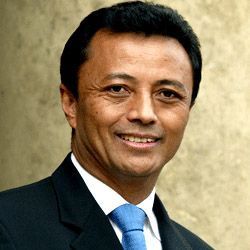Madagascar president digs in as power crumbles
 Antananarivo/Johannesburg - Madagascar's opposition continued to ratchet up pressure on President Marc Ravalomanana to resign on Monday, rubbishing his proposal for a referendum and ordering his arrest for alleged constitutional violations.
Antananarivo/Johannesburg - Madagascar's opposition continued to ratchet up pressure on President Marc Ravalomanana to resign on Monday, rubbishing his proposal for a referendum and ordering his arrest for alleged constitutional violations.
But the embattled president of seven years was refusing to quit, despite losing control of the government and the army.
A defiant Ravalomanana emerged from his palace Sunday to tell supporters he still had a mandate to govern after being re-elected in 2006 and proposing that the attempt to oust him be put to a vote.
The referendum proposal, which analysts deem unworkable in such a tense political climate, is seen as a last-ditch attempt by Ravalomanana to cling to power after opposition leader Andry Rajoelina grabbed de facto power at the weekend.
Rajoelina's proposed interim government took over government buildings with a promise to hold elections within two years.
Over 100 people have been killed since Rajoelina began leading mass protests over the president's authoritarian style, bringing the island of around 20 million mainly subsistence farmers to its knees.
The 34-year-old mayor of 18 months was initially seen as little match for the 59-year-old president.
His preemptive declaration that he was the country's president in January drew widespread derision. His exhortation to his followers to take over the president's offices on February 7 was also held partly responsible for the bloodbath that ensued.
But the killings that day were more damaging for the president. Guards at the palace opened fire without warning on unarmed demonstrators, killing 28 people.
The excessive force eroded support for the president, a self-made millionaire who was cheered as a champion of the poor on his arrival to power in 2002.
Reports that he had called up foreign mercenaries added to the growing unease in the former French colony about his rule.
The allegations gained currency when five white men posing as tourists were photographed directing security operations in the capital.
Last week, the army began refusing the president's orders, saying it would no longer be used by the president against the population and pledging to remain neutral.
Buoyed by the mutiny, Rajoelina has adopted a hardline stance, refusing talks and threatening on Monday to storm the presidential palace with his supporters.
His choice for interim justice minister announced a mandate for the president's arrest - even though Rajoelina's government has no legitimate authority.
But Rajoelina's power grab is not to everyone's liking.
"Madagascans are wary of people arriving in power through the street," Jean-Eric Rakotoarisoa, vice-chancellor of the University of Antananarivo said, noting Ravalomanana had used similar tactics to oust dictator Didier Ratsiraka.
Meanwhile, the international community is continuing to push for a national conference of all stakeholders to resolve the conflict.
Three days of United Nations-mandated talks that were scheduled to take place last week were postponed when Rajoelina refused to participate.
"This is the only way to get a lasting solution," a Western diplomat, who spoke on condition of anonymity said, warning any unconstitutional change of power would be tantamount to a coup.
That message was also hammered home by the African Union's Peace and Security Council after a meeting in Ethiopia Monday. (dpa)